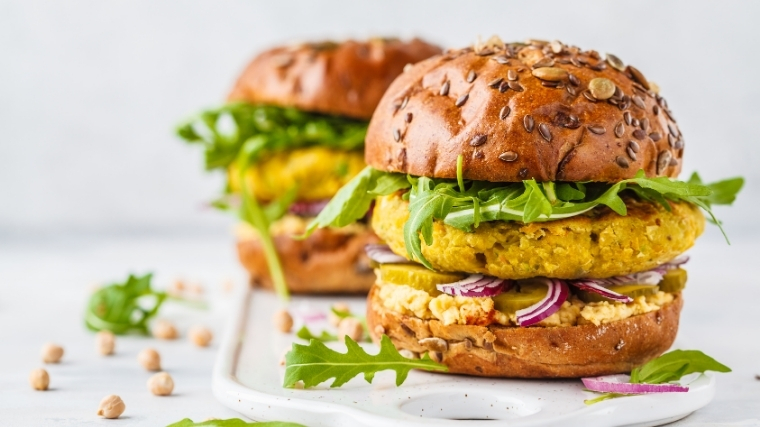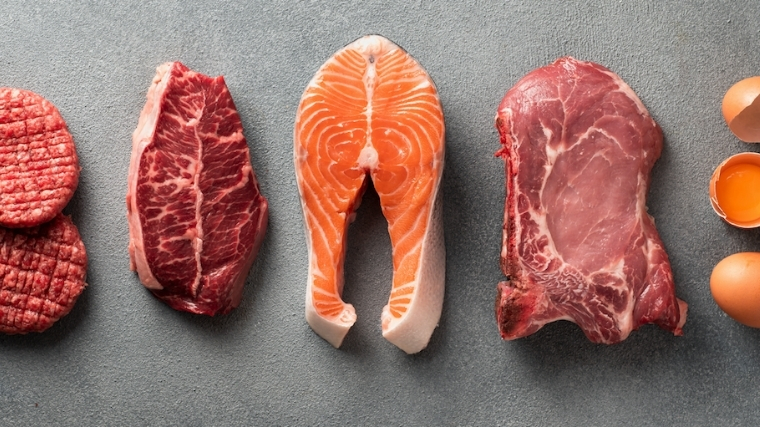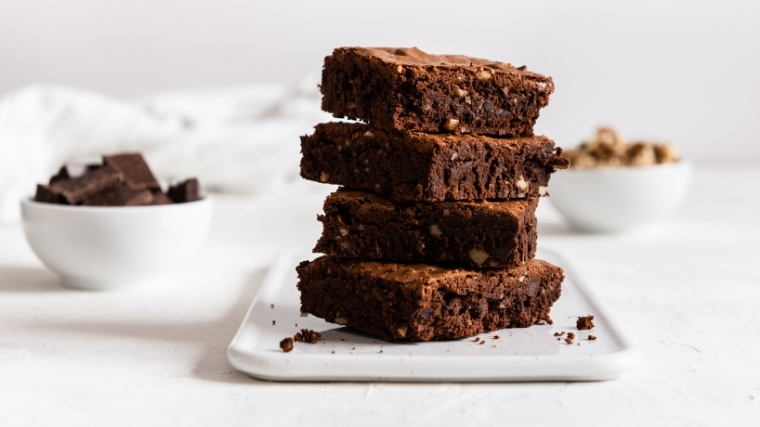5 Different Types of Special Diets
Diet culture feels more ubiquitous than ever before. Gone are the days where most folks would grab a hard roll, slather on some butter, and get on with their lives. Now, there's a seemingly endless number of ways one can eat to lose weight, gain muscle, boost focus, and feel healthier in general. And a lot of people are following different diets.
It's estimated that 45 million people go on a diet each year, and Grand View Research claims that the weight management market is valued at $288 billion in 2020. Searching for diet advice online can be exhaustive, and it may lead you to unreliable sources. By having a better understanding of the most common types of diets, you can decide which one works best for your lifestyle and overall goals (whether that's to slim down, bulk up, or be healthier). Here is our list of common diets that you should know about:
Different Types of Diets
- Intermittent Fasting
- Mediterranean Diet
- The Ketogenic Diet
- If It Fits Your Macros
- Veganism
- Carnivore Diet
- Paleo Diet
- Dessert with Breakfast Diet
- Sirtfood Diet
Editor's note: The content on BarBend is meant to be informative in nature, but it should not be taken as medical advice. The opinions and articles on this site are not intended for use as diagnosis, prevention, and/or treatment of health problems. It's always a good idea to talk to your doctor before beginning a new fitness, nutritional, and/or supplement routine. None of these supplements are meant to treat or cure any disease. If you feel you may be deficient in a particular nutrient or nutrients, please seek out a medical professional.
A Word About Diets
Before we dive into the different types of diets, it's important to note that none of these options are the be-all, end-all for your health needs. You can lose weight on just about any diet, so long as you're in a caloric deficit (that is, you burn more calories than you consume). (1) The same is true if you're looking to put on some muscle mass. No diet is necessarily better than the other in accomplishing this. Prioritize calories first, and then choose a diet style based on your preference.
Studies have also shown that the quality of food is just as if not more important than the number of macronutrients (protein, carbohydrates, and fats) you take in. (2) In other words: if you're following a low-carb diet, you need to make sure you're eating quality fats and protein, too. On the flip, opt for whole grains over refined starches if eating a diet lower in fat.
Lastly, some diets may lack vital micronutrients (vitamins and minerals) necessary for everyday life — vegetarians, for example, are more likely to develop an iron deficiency than their meat-eating counterparts. Iron deficiencies can lead to anemia, the symptoms of which include fatigue, chest pain, and even pale skin. Of course, you should always consult a doctor, but eating a wider variety of food or taking a supplement may help with any deficiencies.
That said, here's a list of the more popular diets in 2020 and what they're all about.
Intermittent Fasting
Unless this is your first time on a fitness website, you're probably already familiar with intermittent fasting (sometimes called IF). For the uninitiated, this isn't so much a diet as an eating strategy where you consume all of your calories in a set time period and then fast for the rest of the day.
There are different approaches to intermittent fasting, with the most popular being an 8:16 split — meaning you consume your calories in an eight-hour eating window and fast for the other 16 hours of the day. You can also do a 10:16, 16:10, or even 6:20 eating:fasting split. Some extremists go as far as squeezing a whole day's worth of calories into a single hour.
The concept is that you'll be eating fewer calories since you're squeezing them into a narrower timeframe, as opposed to consuming them throughout the day.
During the fasting period, you're allowed zero-calorie beverages such as black coffee, herbal teas, and sparkling and flat water.
Several studies have found that IF not only results in weight loss but can help improve insulin resistance, reduce oxidative stress on your cells, stabilize blood sugar levels, and reduce the risk of strokes. (3)(4)
Mediterranean Diet
As the name suggests, the Mediterranean Diet is inspired by the eating habits of people who live near the Mediterranean Sea. Those countries include Greece, Italy, Spain, Lebanon, Turkey, and more. These countries have some of the longest life expectancies in the world. According to a study in the Lancet Medical Journal, Spain's citizens are expected to live to an average age of 85.8 years. (5) The United States' life expectancy, for comparison, is about 78.5 years.
The diet is rich in heart-healthy foods such as vegetables, fish, fruit, grains, olive oil, and nuts. Consumption of red meat is kept to a minimum, and dairy intake is moderate and consists of high-quality sources such as yogurt and cheeses.
Experts, however, also point out that people in the Mediterranean have better lifestyle habits than Americans. Typically, these people are less sedentary, drink and smoke less, and have better sleeping habits.
A study published in theAmerican Journal of Clinical Nutrition found that not only did the Mediterranean Diet lead to weight loss, but it was also the easiest for people to adhere to when compared to intermittent fasting and the paleo diet. (6) When adhered to, the diet has also been found to reverse symptoms of diabetes and cardiovascular diseases. (7)
The Ketogenic Diet
In recent years, the Ketogenic diet has arguably been one of the most discussed and debated diet. Even if you're not a follower, you've no doubt seen specially designed keto snacks on store shelves for its devotees.
But what is it? Keto, as it's called for short, is a diet that prioritizes fat (65-75 percent of your daily calories), with moderate protein consumption (20-30 percent) and very few carbs (only about five percent, though some versions prohibit carbs altogether). Which means you'll be eating a lot of avocados, eggs, and bunless cheeseburgers.
The Keto diet was designed to keep the body in a near-constant state of ketosis, a metabolic state where the body creates ketones from fat to use as energy instead of sugar from carbs (the body's primary and preferred energy source). There have also been claims it may help treat cancer and even respiratory illnesses. (8) As mentioned above, weight loss comes down to calories in vs. calories out. Several studies point out keto is no more effective for weight loss when calories are matched with other diets. (9)
If It Fits Your Macros (IIFYM)
Most people fall off their diets because it's too regimented — you have to eat the same thing day after day. Eating chicken, rice, and broccoli on repeat until your next cheat meal is miserable for most folks. Enter "If It Fits Your Macros," a more flexible dieting approach that lets you eat whatever you want as long as you hit your pre-determined protein, carb, and fat targets.
First, you must determine how much of each macronutrient you need to eat per day to accomplish your goals, whether to lose weight or gain weight. How much of each macro a person needs will change based on that specific person and their goals. Here's a good starting point: the acceptable macronutrient range says you should get 45-65 percent of your daily calories from carbs, 20-35 percent from fat, and 10-35 percent from protein. We also have a macro calculator that you can consult as a starting point. Really, though, your best bet is to speak with a registered dietitian.
From there, make sure that everything you eat fits into those macros by tracking what you eat on an app like MyFitnessPal. You can eat a slice of pizza or your favorite Little Debbie cake so long as you don't go over your carb or fat limit. And therein lies the dilemma many people face. If you indulge in one of those treats at lunch, you'll need to pay close attention to what you eat for the rest of the day and, theoretically, could be forced to eat a pure protein meal for dinner (which wouldn't be the worst thing).
IIFYM is often touted as an anti-diet, but it is absolutely a diet. Your macros will only allow for so many treats. Most of the time, you'll be eating the typical healthy foods, so your macros remain balanced and you stay full.
Veganism
Veganism is one of the fastest-growing movements in the United States. Six percent of Americans identified as vegans in 2017, up from just one percent in 2014. And the alternative meat industry — which includes products such as Beyond Burgers — is expected to be valued at $140 billion over the next decade.

While mainstream media considers it a diet, wherein followers avoid animal-based products, some consider it a lifestyle (many vegans avoid wearing any leather or animal hide). A few years ago, vegans would only eat beans, legumes, grains, egg-free pasta, fruits, and vegetables. But advances in technology have allowed the alternative meat industry have provided vegans access to a wider variety of products.
Various studies point to veganism's benefits. One study that followed 250,000 people and their eating habits found that vegans had a 25 percent lower risk of heart disease and an eight percent lower risk of cancer than those who ate animal products. (10)
Vegans, though, are at a higher risk of being deficient in vitamins and minerals such as iron, zinc, vitamin D, calcium, and omega-3 fatty acids, all of which are vital to everyday health.
Carnivore Diet
What if your mother's advice to eat your vegetables was a lie? That's the essence of the carnivore diet, the antithesis of veganism. Carnivore devotees only eat animal-based products — meat, cheese, milk, animal-based fats, and eggs (though some variations only allow meat, no eggs, and dairy). There are no grains, no vegetables, and no fruits. No, that's not a joke.

Also known as the Zero Carb Diet, it's basically a variation of the keto diet since it's fat and protein is prioritized over carbs. This diet approach flies in the face of scientific research that proves that limiting your meat intake can extend your life and improve cardiovascular health. Still, its followers are have claimed it can fight inflammation and prevent nutrient deficiencies. There is proof that it can lead to weight loss, especially since protein increases the body's thermic effect of feeding —the energy it takes to digest food.
The scientific consensus, though, is that this diet may lead to an increased risk of heart disease, cancer, and overall risk of death because there are no fruits or vegetables in it. (11)(12)
Paleo Diet
The Paleo diet, sometimes called "The Caveman Diet," could be considered a cousin of the carnivore diet. In addition to meat, you're also eating fish, vegetables, fruit, nuts, and seeds. You need to avoid any grains, dairy, processed foods, beans, legumes, and sugars while adhering to this diet.

Studies have shown that it's effective in helping people lose weight, drop their blood pressure, and improve other blood markers. (13)(14) Many researchers, though, point out there's not enough evidence of the diet's effects on health and that more research needs to be done. Others also warn against the diet's exclusion of whole grains, which has been shown to ward off heart disease and diabetes.
Dessert with Breakfast Diet
You probably start each morning with a plate of eggs and some oatmeal, but how would you feel about finishing that with a cookie or a slice of cake? Well, you can. The Dessert with Breakfast Diet is exactly what it sounds like — a sugary treat first thing in the morning. It sounds too good to be true, but there's evidence it works.

A 2012 study in the journalSteroids found that people who ate a high-carb, high-protein meal that included a dessert lost more weight and kept it off for the duration of the eight-month-long study than those who had a low-carb, high-protein breakfast. (15)
Of course, you need to know yourself before trying this diet. Some studies have shown that sugar may be addictive, and some people can be triggered to eat more tasty food after having a little. (16) Remember the Lay's slogan, "Betcha can't eat just one?" They weren't just being cute. Another study had participants bid on snack foods such as Cheetos, Snickers, and Coca-Cola. After tasting the treats, their second bids rose by an average of 38%. (17) Processed junk food is chemically engineered to taste great, so approach this diet with some caution if you're prone to indulging in common junk foods.
Sirtfood Diet
Thanks to endorsements from Adele and British royal Pippa Middleton, the Sirtfood Diet has grown in popularity in recent years. Created by nutritionists Aidan Goggins and Glen Matten, the diet focuses on foods high in sirtuins, a group of proteins found in the body that regulate metabolism.
Foods high in sirts include red wine, dark chocolate, walnuts, Medjool dates, walnuts, arugula, coffee, capers, and extra-virgin olive oil.

Following the Sirtfood Diet isn't as simple as just eating those foods. Goggins and Matten prescribe a two-phase approach. In the first, you can only drink three sirtfood green juices and eat one full meal rich in sirtfoods, which amounts to 1,000 calories for three days.
On days four to seven, your caloric intake goes up to 1,500. Then, in Phase two, you eat three sirtfood-rich meals per day and a green juice for two weeks. After that, you can either repeat that process or stick to a diet rich in sirts while continuing to drink at least one juice per day.
The celebrity endorsements aside, there's little proof that the specific diet works for weight loss or better health. One study found that mice with high sirt levels had more fat loss than other mice. (18) That said, no mention was made of total calories consumed or other notable weight-loss factors. So, it's difficult to directly link more sirtuins to weight loss.
More on Diets
The word diet refers to anything we eat daily. Remember that the best diet for you is the one that will help you reach your goals but that you can also stick to. Here's some more diet-related content from BarBend:
- Could you Just Live on Meal Replacement Shakes?
- 3 Misconceptions CrossFit Athletes Have About Nutrition
- Macronutrients vs Micronutrients — Which Matter Most?
References
- Yumuk V, Tsigos C, Fried M, Schindler K, Busetto L, Micic D, Toplak H; Obesity Management Task Force of the European Association for the Study of Obesity. European Guidelines for Obesity Management in Adults. Obes Facts. 2015;8(6):402-24. doi: 10.1159/000442721. Epub 2015 Dec 5. Erratum in: Obes Facts. 2016;9(1):64. PMID: 26641646; PMCID: PMC5644856.
- Shan Z, Guo Y, Hu FB, Liu L, Qi Q. Association of Low-Carbohydrate and Low-Fat Diets With Mortality Among US Adults.JAMA Intern Med.2020;180(4):513–523. doi:10.1001/jamainternmed.2019.6980
- Sofia Cienfuegos, Kelsey Gabel, Faiza Kalam, Mark Ezpeleta, Eric Wiseman, Vasiliki Pavlou, Shuhao Lin, Manoela Lima Oliveira, Krista A. Varady, Effects of 4- and 6-h Time-Restricted Feeding on Weight and Cardiometabolic Health: A Randomized Controlled Trial in Adults with Obesity, Cell Metabolism, Volume 32, Issue 3, 2020, Pages 366-378.e3, ISSN 1550-4131, https://doi.org/10.1016/j.cmet.2020.06.018. (http://www.sciencedirect.com/science/article/pii/S1550413120303193)
- Michael J. Wilkinson, Emily N.C. Manoogian, Adena Zadourian, Hannah Lo, Savannah Fakhouri, Azarin Shoghi, Xinran Wang, Jason G. Fleischer, Saket Navlakha, Satchidananda Panda, Pam R. Taub, Ten-Hour Time-Restricted Eating Reduces Weight, Blood Pressure, and Atherogenic Lipids in Patients with Metabolic Syndrome, Cell Metabolism, Volume 31, Issue 1, 2020, Pages 92-104.e5, ISSN 1550-4131, https://doi.org/10.1016/j.cmet.2019.11.004. (http://www.sciencedirect.com/science/article/pii/S1550413119306114)
- Kyle J Foreman, Neal Marquez, Andrew Dolgert, Kai Fukutaki, Nancy Fullman, Madeline McGaughey, Martin A Pletcher, Amanda E Smith, Kendrick Tang, Chun-Wei Yuan, Jonathan C Brown, Joseph Friedman, Jiawei He, Kyle R Heuton, Mollie Holmberg, Disha J Patel, Patrick Reidy, Austin Carter, Kelly Cercy, Abigail Chapin, Dirk Douwes-Schultz, Tahvi Frank, Falko Goettsch, Patrick Y Liu, Vishnu Nandakumar, Marissa B Reitsma, Vince Reuter, Nafis Sadat, Reed J D Sorensen, Vinay Srinivasan, Rachel L Updike, Hunter York, Alan D Lopez, Rafael Lozano, Stephen S Lim, Ali H Mokdad, Stein Emil Vollset, Christopher J L Murray, Forecasting life expectancy, years of life lost, and all-cause and cause-specific mortality for 250 causes of death: reference and alternative scenarios for 2016–40 for 195 countries and territories, The Lancet, Volume 392, Issue 10159, 2018, Pages 2052-2090, ISSN 0140-6736, https://doi.org/10.1016/S0140-6736(18)31694-5. (http://www.sciencedirect.com/science/article/pii/S0140673618316945)
- Michelle R Jospe, Melyssa Roy, Rachel C Brown, Jillian J Haszard, Kim Meredith-Jones, Louise J Fangupo, Hamish Osborne, Elizabeth A Fleming, Rachael W Taylor, Intermittent fasting, Paleolithic, or Mediterranean diets in the real world: exploratory secondary analyses of a weight-loss trial that included choice of diet and exercise,The American Journal of Clinical Nutrition, Volume 111, Issue 3, March 2020, Pages 503–514, https://doi.org/10.1093/ajcn/nqz330
- Filippatos TD, Panagiotakos DB, Georgousopoulou EN, Pitaraki E, Kouli GM, Chrysohoou C, Tousoulis D, Stefanadis C, Pitsavos C; ATTICA Study Group. Mediterranean Diet and 10-year (2002-2012) Incidence of Diabetes and Cardiovascular Disease in Participants with Prediabetes: The ATTICA study. Rev Diabet Stud. 2016 Winter;13(4):226-235. doi: 10.1900/RDS.2016.13.226. Epub 2017 Feb 10. PMID: 28278309; PMCID: PMC5734223.
- Brianna J. Stubbs, Andrew P. Koutnik, Emily L. Goldberg, Vaibhav Upadhyay, Peter J. Turnbaugh, Eric Verdin, John C. Newman, Investigating Ketone Bodies as Immunometabolic Countermeasures against Respiratory Viral Infections, Med, 2020, ISSN 2666-6340, https://doi.org/10.1016/j.medj.2020.06.008. (http://www.sciencedirect.com/science/article/pii/S2666634020300131)
- Johnston CS, Tjonn SL, Swan PD, White A, Hutchins H, Sears B. Ketogenic low-carbohydrate diets have no metabolic advantage over nonketogenic low-carbohydrate diets. Am J Clin Nutr. 2006 May;83(5):1055-61. doi: 10.1093/ajcn/83.5.1055. PMID: 16685046.
- Dinu M, Abbate R, Gensini GF, Casini A, Sofi F. Vegetarian, vegan diets and multiple health outcomes: A systematic review with meta-analysis of observational studies. Crit Rev Food Sci Nutr. 2017 Nov 22;57(17):3640-3649. doi: 10.1080/10408398.2016.1138447. PMID: 26853923.
- Hartley L, Igbinedion E, Holmes J, Flowers N, Thorogood M, Clarke A, Stranges S, Hooper L, Rees K. Increased consumption of fruit and vegetables for the primary prevention of cardiovascular diseases. Cochrane Database Syst Rev. 2013 Jun 4;2013(6):CD009874. doi: 10.1002/14651858.CD009874.pub2. PMID: 23736950; PMCID: PMC6464871.
- Bazzano LA, Serdula MK, Liu S. Dietary intake of fruits and vegetables and risk of cardiovascular disease. Curr Atheroscler Rep. 2003 Nov;5(6):492-9. doi: 10.1007/s11883-003-0040-z. PMID: 14525683.
- Österdahl, M., Kocturk, T., Koochek, A.et al.Effects of a short-term intervention with a paleolithic diet in healthy volunteers.Eur J Clin Nutr62,682–685 (2008). https://doi.org/10.1038/sj.ejcn.1602790
- Jönsson T, Granfeldt Y, Ahrén B, et al. Beneficial effects of a Paleolithic diet on cardiovascular risk factors in type 2 diabetes: a randomized cross-over pilot study.Cardiovasc Diabetol. 2009;8:35. Published 2009 Jul 16. doi:10.1186/1475-2840-8-35
- Daniela Jakubowicz, Oren Froy, Julio Wainstein, Mona Boaz, Meal timing and composition influence ghrelin levels, appetite scores and weight loss maintenance in overweight and obese adults, Steroids, Volume 77, Issue 4, 2012, Pages 323-331, ISSN 0039-128X, https://doi.org/10.1016/j.steroids.2011.12.006. (http://www.sciencedirect.com/science/article/pii/S0039128X11003515)
- Avena NM, Rada P, Hoebel BG. Evidence for sugar addiction: behavioral and neurochemical effects of intermittent, excessive sugar intake.Neurosci Biobehav Rev. 2008;32(1):20-39. doi:10.1016/j.neubiorev.2007.04.019
- The computational form of craving is a selective multiplication of economic value, Anna B. Konova, Kenway Louie, Paul W. Glimcher, Proceedings of the National Academy of Sciences Apr 2018, 115 (16) 4122-4127; DOI: 10.1073/pnas.1714443115
- Chang HC, Guarente L. SIRT1 and other sirtuins in metabolism. Trends Endocrinol Metab. 2014 Mar;25(3):138-45. doi: 10.1016/j.tem.2013.12.001. Epub 2013 Dec 30. PMID: 24388149; PMCID: PMC3943707.
Featured image: George Dolgikh/Shutterstock
5 Different Types of Special Diets
Source: https://barbend.com/types-of-diets/
0 Response to "5 Different Types of Special Diets"
Post a Comment